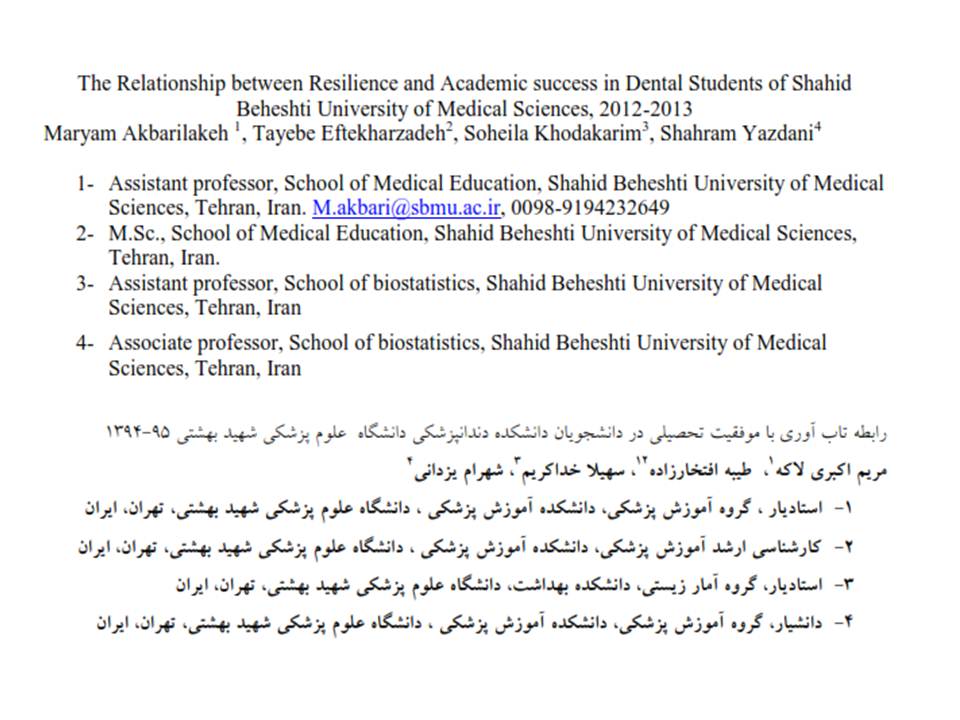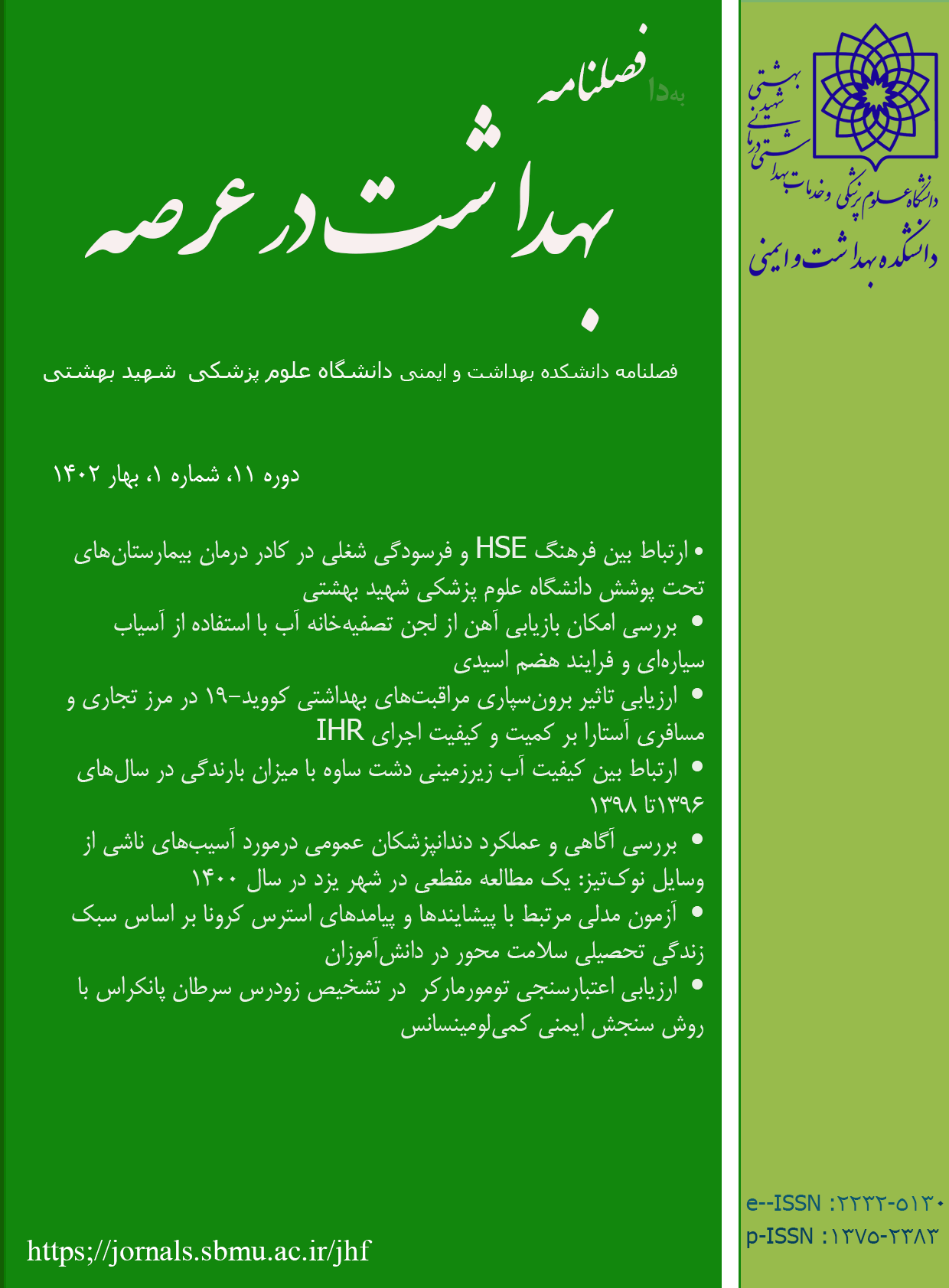رابطه تاب آوری با موفقیت تحصیلی در دانشجویان دانشکده دندانپزشکی دانشگاه علوم پزشکی شهید بهشتی 95-1394
فصلنامه علمی پژوهشی بهداشت در عرصه,
دوره 5 شماره 3,
22 أيلول 2017
,
صفحه 41-48
https://doi.org/10.22037/jhf.v5i3.17798
چکیده
زمینه و اهداف: شناخت ارتباط برخی ویژگیها از جمله تاب آوری، با موفقیت تحصیلی کمک کننده است. لذا این پژوهش با هدف بررسی ارتباط بین تاب آوری و موفقیت تحصیلی در دانشجویان دندانپزشکی ترتیب داده شد
مواد و روشها: این مطالعه همبستگی از نوع مقطعی بود که تعداد 185 نفر از دانشجوان دندانپزشکی دانشگاه علوم پزشکی شهید بهشتی به ي روش نمونه گیری آسان، در آن شرکت داشتند. ابزار تاب آوری، پرسشنامه کونور دیویدسون و ملاک اندازه گیری موفقیت تحصیلی معدل نمره آزمون علوم پایه بود. تحلیل دادهها با استفاده از آزمون کای دو و رگرسیون لجستیک انجام شد. برای رعایت کامل اخلاق در پژوهش، برای دانشجویان، موضوع تحقیق توضیح داده شد و بعد از گرفتن رضایت شفاهی، در مطالعه شرکت داده شدند.
یافتهها: بین نمره تاب آوری با نمره علوم پاه به عنوان ملاک موفقیت تحصیلی ارتباط مثبت و مستقیم معنی دار مشاهده شد. میانگین نمره يتاب آوری 62/27بود. حداقل نمره تاب آوری 21 و حداکثر نمره تاب آوری 91 تعیین شد. 82/7 درصد دارای نمره علوم پایه بیشتر از 120 موفق و 12/4درصد دارای نمره علوم پایه کمتر از 120 غیرموفق بودند.
نتیجه گیری: نتایج این مطالعه برای برنامهریزان آموزشی، بسیار مفید است. در برنامه فعلی آموزشی دندانپزشکی تاکید بیشتر بر صلاحیت های حرفهای به عنوان عامل موفقیت تحصیلی است، در حالی که برخی خصوصیات شخصیتی فردی هم با موفقیت تحصیلی مستقیما در ارتباط هستند. لذا بر لزوم تغییر و اصلاح برنامه های آموزشی به سمت پرورش ابعاد شخصیتی موثر بر منش و رفتار حرفهای تاکید میشود
- تاب آوری، موفقیت تحصیلی، دانشجویان دندانپزشکی

ارجاع به مقاله
مراجع
Starke MC. Retention, bonding, and academic achievement: Effectiveness of the college seminar in promoting
college success. Proceedings of the 13th Freshman Year Experience National Conference 1994 Feb. 18-22;
Columbia, United States of America.
Beyers W, Goossens L. Psychological separation and adjustment to university: Moderating effects of gender, age,
and perceived parenting style. Journal of Adolescent Research 2003; 18(4):363-82.
Masten AS. Ordinary magic: Resilience processes in development. American Psychologist 2001; 56(3):227-38.
Inzlicht M, Aronson J, Good C, McKay L. A particular resiliency to threatening environments. Journal of
Experimental Social Psychology 2006; 42(3):323-36.
Sabz Ali Snjabi B. Teenage resilience. Monthly Journal of Educational Guidance: Roshd 2010: 83(1):16-17 (In
Persian).
Yazdani A. Investigating the relationship between personality characteristics of hardiness and resilience with
academic achievement in artesian university students in 2012 [dissertation]. School of Medicine: AJA University of
Medical Sciences; 2012 (In Persian).
Connor KM, Davidson JR. Development of a new resilience scale: The Connor-Davidson resilience scale (CDRISC).
Depression and Anxiety 2003; 18(2):76-82.
Mohammadi M. Study of resiliency factors in people at risk of drug abuse [dissertation]. Department of Clinical
Psychology: University of Social Welfare and Rehabilitation Sciences; 2005 (In Persian).
York TT, Gibson C, Rankin S. Defining and measuring academic success. Practical Assessment, Research &
Evaluation 2015; 20(5). ISSN 1531-7714.
Akbari M, Sekandari S. Evaluation of the predictive validity of comprehensive basic science examination for
the adequacy of dentistry students’ clinical competence. Journal of Mashhad Dental School 2016; 40(2):113-22 (In
Persian).
Behboudi F, Panahandeh Z. Predictive validity of the comprehensive basic science examination means score for
assessment of medical students’ performance. Journal of Medical Education 2002; 1(3): 137-38.
Bijari B, Abassi A. Predictive validity of comprehensive basic science examination for medical students’
academic performance in Birjand university of medical sciences. Iranian Journal of Medical Education 2014;
(12):1011-18 (In Persian).
Rahimi R, Aliakbari M. Relationship between of resilience and academic achievement in students with hearing
impairment. Modern Psychological Research 2015; 10(38):119-33 (In Persian).
Lee DD. Impact of resilience on the academic achievement of at-risk students in the Upward Bound Program in
Georgia [dissertation]. College of Graduate Studies: Georgia Southern University; 2009.
Dass-Brailsford P. Exploring resiliency: academic achievement among disadvantaged black youth in South
Africa. South African Journal of Psychology 2005; 35(3):574-91.
Kamalpour S, Azizzadeh-Forouzi M, Tirgary B. A Study of the relationship between resilience and academic
burnout in nursing students. Strides in Development of Medical Education 2017; 13(5):476-87.
Mohebi Nooredinvand MH, Shahani M, Sharifi HP. The relationship of psychological capital (hope, optimism,
resiliency and self-efficacy) with the achievement goals and academic performance of the first-year students.
Research in Curriculum Planning 2014; 2 (13) :61-79 (In Persian).
Habibi H, Fatemi M. Study of the relationship between sex and gender role with the level of resiliency. Quarterly
Journal of Psychological Studies 2015; 11(2):115-34 (In Persian).
Safir MP, Peres Y, Lichtenstein M, ZwiHoch, Shepher J. Psychological androgyny and sexual adequacy. Journal
of Sex & Marital Therapy 1982; 8(3):228-40.
LaFromboise TD, Hoyt DR, Oliver L, Whitbeck LB. Family, community, and school influences on resilience
among American Indian adolescents in the upper Midwest. Journal of Community Psychology 2006; 34(2):193-209.
Henley R. Resilience enhancing psychosocial programmes for youth in different cultural contexts: Evaluation
and research. Progress in Development Studies 2010; 10(4):295-307.
Hartman JL, Turner MG, Daigle LE, Exum ML, Cullen FT. Exploring the gender differences in protective
factors: Implications for understanding resiliency. International Journal of Offender Therapy and Comparative
Criminology 2009; 53(3):249-77.
Yazdani S, AkbariLakeh M, Ahmady S, Foroutan SA, Afshar L. Concept analysis: Value based curriculum.
Biomedical and Pharmacology Journal 2015; 12(1):123-30.
- چکیده مشاهده شده: 776 بار
- PDF دانلود شده: 400 بار
